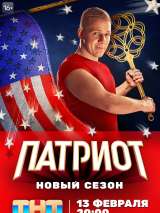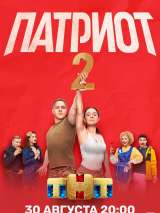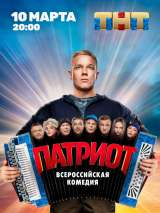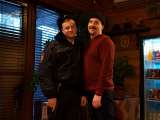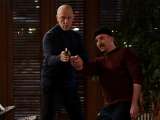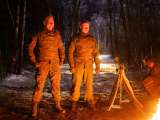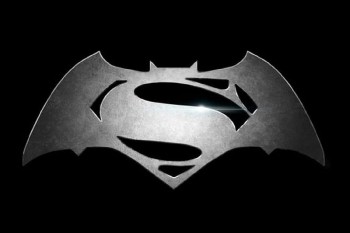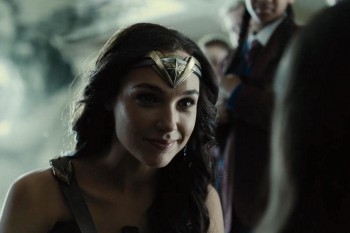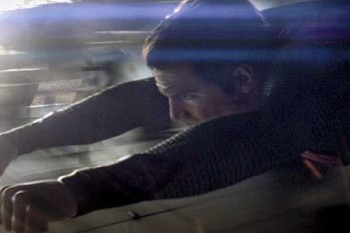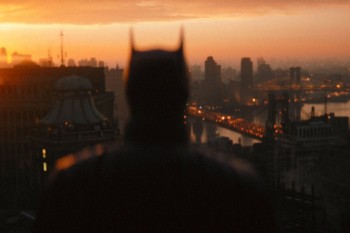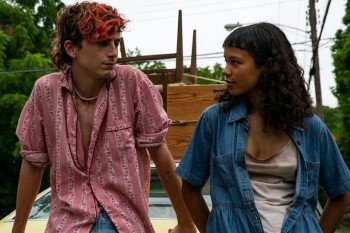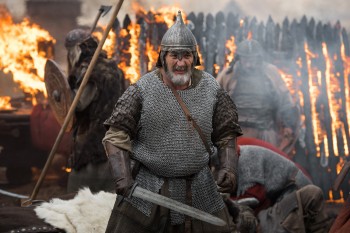Патриот — создатели фильма
- О фильме
- Рецензии
- Актеры и создатели
- Кадры 12
- Трейлеры 3
- Постеры 1
- О фильме
- Рецензии
- Актеры и создатели
- Кадры 12
- Обои
- Трейлеры 3
- Саундтреки
- Постеры 1
- Награды
- АКТЕРЫ
- СОЗДАТЕЛИ
Николай Бурлак
- Режиссер
Добавить в Избранное
В избранное
Управление папками
Антон Зайцев
- Сценарист
Добавить в Избранное
В избранное
Управление папками
Алексей Базанов
- Сценарист
Добавить в Избранное
В избранное
Управление папками
Александр Кагарманов
- Сценарист
Добавить в Избранное
В избранное
Управление папками
Максим Филипьев
- Сценарист
Добавить в Избранное
В избранное
Управление папками
Алексей Литвиненко
- Сценарист
Добавить в Избранное
В избранное
Управление папками
Антон Щукин
- Продюсер
Добавить в Избранное
В избранное
Управление папками
Артем Логинов
- Продюсер
Добавить в Избранное
В избранное
Управление папками
Дмитрий Кондратюк
- Продюсер
Добавить в Избранное
В избранное
Управление папками

Обозреватель TV Mag
Алексей Базанов известен поклонникам «Реальных пацанов» – в долгоиграющем и успешном проекте из Перми он играет неуклюжего и честного полицейского Базанова. Теперь вы увидите его в новом комедийном сериале «Патриот», в котором он не только сыграл одну из ролей, но был и креативным продюсером, и сценаристом проекта. Алексей рассказал TV Mag об идее его комедии, которая, по его словам, отличается от всего, что есть сегодня на российском ТВ.
Как появилась идея «Патриота»?
Я придумал проект «Патриот» с нуля. Изначально над историей я работал один, когда мы снимали пилот. Далее, когда уже запахло сезоном, мы плотнее начали работать с Антоном Зайцевым, увеличили авторскую группу. Мы делали сценарий втроем: одному 26 лет, еще одному – 40 с хвостиком, ну и мне немного за 30. Мы намеренно работали на широкий охват аудитории, чтобы каждый автор знал язык своего поколения в том числе. У нас нет клишейных диалогов, потому что мы знаем привычки и язык простых людей, полицейских, военнослужащих. И на этом держится история, ее реалистичность.
Я дорвался до сериала, где я могу почти все, что мне придет в голову. В «Патриоте» колесо событий идет и идет, нет классического построения истории и объяснения по каждому герою, что часто встречается в сериалах и меня печалит. Я не хочу зрителей держать за амеб. И сугубо из таких соображений и делал, а часто вообще от обратного: я не знаю, как надо и как хочу, но точно вот не так.
Премьера нового комедийного сериала «Патриот» состоялась на ТНТ 10 марта
Мы знаем, что проект стартовал еще два с половиной года назад. Почему результат вашей работы мы увидели только сейчас?
Потому что качественно должно быть. Не хотелось делать чего-то легковесного и банального – с теми же персонажами и теми же шутками. Но сравнивать с другими проектами я вовсе не хочу. Я целенаправленно последние полтора-два года не впускал в себя ничего, чтобы случайно не поддаться каким-то референсам из понравившихся мне проектов.
Но все же на какие проекты вы равнялись?
Мы равнялись на какие-то моменты по персонажам и историям, даже не обязательно из комедий. Я равнялся на многие английские проекты, чтобы показывать лайкобилити-неприятных людей. Англичане лучше всех это делают. Но называть их не буду. Например, чтобы изображать неприятных людей не однотонно и плоско. У нас есть бывший наркоман или мой персонаж, брат главного героя, – оторви и выбрось, но они не дают нам отрицательного восприятия, энергии отталкивающей.
А как подобрались актеры на главные роли?
Я кастингом занимался месяцев восемь, и в результате у нас актерская группа – от Омска до белорусского Гродно. Выбрал всех героев, и очень тщательно. Уже непосредственно с актерами после их утверждения мы доделывали их персонажей – у нас были и актерские читки, и репетиционные дни. Я сам для себя выбрал тяжелую задачу, вызов – обновить линейку комедийных актеров, чтобы уже видеть новые лица в нашем юмористическом кино. Индустрия не должна быть зацикленной. К тому же у нас главные герои все молодые – и актеры соответствуют их возрасту, поэтому в «Патриоте» вы видите немало новых лиц.
Смотрите сериал «Патриот» на ТНТ с понедельника по четверг в 20:00
А где происходит действие?
Мы никогда не называли город – он ноунейм, но и без выдуманного названия. Но по пасхалочкам понять можно. Тем и хорошо – у нас герои не живут в выдуманном мире, далеком от реальности. И поэтому нам не надо натягивать реальность на историю.
Можно ли говорить, что идея «Патриота» немного перекликается с «Реальными пацанами»?
Нет, абсолютно нет! В «Реальных пацанах» стоит другой герой, у которого все действия направлены вовнутрь, он даже сам говорит в первой серии: «Стать другим реально». И он своим косноязычием и своими действиями пытается, старается, рассказывая истории. У нас в «Патриоте» герой приходит и говорит: «Вы все живете неправильно, я сейчас вам все объясню». И весь его вектор идет по этой линии, вне, от себя. Так что я бы вообще не сравнивал. И это не «живая камера», не мокьюментари, это художественного плана кадры, которых не было в «Реальных пацанах» никогда. Каждый из окружения – противовес герою, каждый персонаж предстает перед нашим патриотом испытанием. У нас «ноу концепт», а у «Реальных» «хай концепт».
Что зацепит зрителя в «Патриоте»?
Отличие от любого другого проекта на ТВ. Во всем. К тому же эффект новизны сработает. Герой, который стоит особняком. И еще сюжет и диалоги очень высокого качества. Мне очень хочется, чтобы это была законченная история – в идеальном мире это два-три сезона.
Смотрите сериал «Патриот» с понедельника по четверг в 20:00 на ТНТ.
Фото: ТНТ
| The Patriot | |
|---|---|

Theatrical release poster |
|
| Directed by | Roland Emmerich |
| Written by | Robert Rodat |
| Produced by |
|
| Starring |
|
| Cinematography | Caleb Deschanel |
| Edited by |
|
| Music by | John Williams |
|
Production |
|
| Distributed by | Columbia Pictures[1] |
|
Release dates |
|
|
Running time |
165 minutes[2] |
| Country | United States |
| Language | English |
| Budget | $110 million[3] |
| Box office | $215.3 million[3] |
The Patriot is a 2000 American epic historical war film written by Robert Rodat, directed by Roland Emmerich and starring Mel Gibson, Chris Cooper, Heath Ledger and Jason Isaacs. The story takes place mainly in rural Berkeley County in South Carolina and depicts Benjamin Martin (Gibson), an American colonist opposed to going to war with Great Britain who, along with his adult son, (Ledger) gets swept into the Revolutionary War when his home life is disrupted and one of his sons is murdered by a cruel British officer (Isaacs). Rodat has said Martin is a composite character based on four historical men: Andrew Pickens, Francis Marion, Daniel Morgan and Thomas Sumter.
Most of the film’s events occur in the Southern theater of the war. Despite receiving generally positive reviews from critics, it was harshly criticized by British critics and historians and stirred controversy in the United Kingdom due to its themes of anti-British sentiment, its fictionalized portrayal of British figures and atrocities, including killing wounded soldiers and prisoners of war, the film’s main villain shooting a child in cold blood and an ahistorical scene in which a church filled with colonists is locked and burned which was controversial due to it being similar to the Oradour-sur-Glane massacre, a World War II war crime perpetrated by the Waffen-SS in June 1944. In his review of the film, critic Roger Ebert wrote, «None of it has much to do with the historical reality of the Revolutionary War».[4]
Plot[edit]
During the American Revolutionary War in 1776, Captain Benjamin Martin, a veteran of the French and Indian War and a widower with seven children, is called to Charleston to vote in the South Carolina General Assembly on a levy supporting the Continental Army. Fearing war against Great Britain and not wanting to force others to fight when he will not, Benjamin abstains; the vote is nonetheless passed, and, against his father’s wishes, Benjamin’s eldest son Gabriel joins the Army.
Two years later, Charleston falls to the British and a wounded Gabriel returns home carrying dispatches. The Martins care for both British and American wounded from a nearby battle before British Dragoons led by Colonel William Tavington arrive, arrest Gabriel with the intention of hanging him as a spy, and seize Benjamin’s African American enslaved workers for their own use. When Benjamin’s son Thomas tries to free Gabriel, he is shot and killed by Tavington, who then orders the Martins’ house burned and all wounded Americans executed. After the British leave, Benjamin, accompanied by his two younger sons, set up a row of muskets and ambush the British convoy transporting Gabriel. Benjamin skillfully, yet brutally, slaughters several British troops with his tomahawk. A British survivor tells Tavington of the attack, earning Benjamin the moniker of the «Ghost».
Gabriel decides to rejoin the Continentals and Benjamin soon follows, leaving the younger children in the care of Benjamin’s sister-in-law, Charlotte. While traveling, they witness American soldiers and militiamen under General Horatio Gates engaging the British Army. Benjamin points out the foolishness of undisciplined and untested men fighting well-trained British regulars on open ground; sure enough, the Continentals are decisively routed. Benjamin meets his former commanding officer, Col. Harry Burwell, who appoints him as colonel of a newly raised militia unit due to his combat experience and also places Gabriel under his father’s command. Benjamin is tasked with weakening Lord Cornwallis’s regiments through a sustained campaign of guerrilla warfare. Benjamin is also provided the service of French Major Jean Villeneuve, who helps train the militia and promises more French aid.
Gabriel asks why Villeneuve and others often mention an incident at Fort Wilderness. Benjamin, having been hesitant to answer the question up to now, finally tells his son: while fighting in the British Army, he and several other soldiers discovered French soldiers committing an atrocity against British colonists. The enraged men caught up with the retreating French at Fort Wilderness and killed all but two of them. The survivors were forced to gather the heads of their comrades and present them to the Cherokee, convincing the tribe to betray the French and side with the British. Benjamin reveals that he has been haunted by guilt ever since.
Benjamin’s militia carries out brutal ambushes of British patrols and supply caravans, even capturing some of Cornwallis’ personal effects and his two Great Danes, and burn the bridges and ferries needed by Cornwallis. The general angrily blames Tavington for his setbacks, but when Benjamin uses what Cornwallis perceives as a dishonorable ploy to free some of the captured men, he reluctantly permits Tavington to do whatever he pleases if it puts a stop to the attacks. With the reluctant aid of Wilkins, a local Loyalist, Tavington has the homes of several militiamen burned and their families executed. Benjamin’s family flees Charlotte’s plantation as it is burned to live in a Gullah settlement with formerly enslaved residents. There, Gabriel marries his betrothed, Anne.
Tavington’s brigade raids a town that has been secretly providing the militia with food. He has all the residents, including Anne and her parents, assembled in the church and demands the location of their camp. After their location is given, he has the doors barricaded, and orders the church to be burned, killing everyone inside. When they discover the tragedy, Gabriel and several other soldiers attack Tavington’s encampment; Tavington is wounded but manages to kill Gabriel before retreating. Benjamin mourns and contemplates desertion before being reminded of his son’s dedication to the cause by finding an American flag he repaired. Martin’s militia, along with a larger Continental Army regiment, confronts Cornwallis’ troops in a decisive battle at Cowpens. Benjamin rallies his side, and he and Tavington meet in personal combat. Tavington disarms and wounds Benjamin with his saber, before preparing to deliver the coup de grâce. At the last second, Benjamin dodges the attack and impales Tavington twice in the abdomen and throat respectively, killing him. The battle is a Continental victory, and Cornwallis sounds the retreat.
After many retreats, Cornwallis is besieged at Yorktown, Virginia where he surrenders to the surrounding Continental Army and the long-awaited French naval force. After the conflict ends, Benjamin returns to his family, with Charlotte carrying their new baby, and discovers members of his former militia unit rebuilding his homestead on their old town road.
Cast[edit]
- Mel Gibson as Captain/Colonel Benjamin Martin
A veteran of the French and Indian War, the hero of the fictional Fort Wilderness, and widowed father of seven children, He is based on a composite of historical characters which include Thomas Sumter, Daniel Morgan, Nathanael Greene, Andrew Pickens, and Francis Marion.[5] - Joely Richardson as Charlotte Selton
Benjamin’s sister-in-law and later wife. She is the owner of a plantation that is burned down by the British. She looks after Benjamin’s children while he is fighting; eventually they have a child together. - Heath Ledger as Corporal Gabriel Edward Martin
Benjamin’s eldest child, and the husband of Anne Howard. He decides to join up with the Continental Army against his father’s wishes. - Lisa Brenner as Anne Patricia Howard
Gabriel’s childhood friend and love interest. - Gregory Smith as Thomas Martin
Benjamin’s second son, he, like Gabriel, is anxious to fight in the war, but Benjamin says he has to wait because of his age. He is shot and killed by Tavington when he protests against Gabriel’s arrest. - Trevor Morgan as Nathan Martin
Third son, he and Samuel help around the farm. - Bryan Chafin as Samuel Martin
Fourth son, he is usually seen helping Nathan around the farm. - Mika Boorem as Margaret «Meg» Martin
Benjamin’s older daughter, she is often seen taking care of her younger siblings. - Logan Lerman as William Martin, Benjamin’s fifth and youngest son.
- Skye McCole Bartusiak as Susan Martin
The youngest of Benjamin’s seven children, initially she will not speak, which may be a post-traumatic reaction to the death of their mother Elizabeth. - Jason Isaacs as Colonel William Tavington
Colonel of the Green Dragoons, he’s portrayed as a brutal and psychopathic commander. The character is based on Banastre Tarleton.[5] - Chris Cooper as Colonel/Brigadier General Harry Burwell
One of Benjamin’s commanding officers in the French and Indian War and a colonel of the Continental Army. He fought in the 1775 Battle of Bunker Hill. He is based on Lieutenant Colonel Henry «Light Horse Harry» Lee. - Tchéky Karyo as Major Jean Villeneuve
A French officer who trains Martin’s militia, he holds a grudge against Martin for his part in the French and Indian War, but they become close friends by the war’s end. He serves as Martin’s second-in-command. - René Auberjonois as Reverend Oliver
A minister of Pembroke who volunteers to fight with the militia. - Tom Wilkinson as Lieutenant General Charles Cornwallis, 2nd Earl Cornwallis
A general of the British army. - Donal Logue as Dan Scott
One of Benjamin’s men. He is a racist and bullies the former slave Occam, but grows to befriend him. - Peter Woodward as Brigadier General Charles O’Hara
Cornwallis’ second-in-command. - Leon Rippy as John Billings
One of Benjamin’s neighbors and oldest friends who joins the militia. He is one of the 18 captured men taken to Fort Carolina and later released by Benjamin. - Adam Baldwin as Captain James Wilkins
An officer in the Loyalist Colonial militia recruited into the Green Dragoons by Captain Bordon. - Jamieson K. Price as Captain Bordon
Tavington’s second-in-command of the Green Dragoons. - Jay Arlen Jones as Occam
A black slave who is sent to fight in his master’s place. - Joey D. Vieira as Peter Howard
Anne Howard’s father. - Zach Hanner as British field officer.
- Terry Layman as General George Washington.
- Andy Stahl as General Nathanael Greene.
- Grahame Wood as a British Lieutenant.
Production[edit]
Script[edit]
Screenwriter Robert Rodat wrote seventeen drafts of the script before there was an acceptable one. In an early version, Anne is pregnant with Gabriel’s child when she dies in the burning church. Rodat wrote the script with Gibson in mind for Benjamin Martin, and gave the Martin character six children to signal this preference to studio executives. After the birth of Gibson’s seventh child, the script was changed so that Martin had seven children. Like the character William Wallace, which Gibson portrayed in Braveheart five years earlier, Martin is a man seeking to live his life in peace until revenge drives him to lead a cause against a national enemy after the life of an innocent family member is taken.
Casting[edit]
Harrison Ford turned down the lead role of Benjamin Martin because he considered the film «too violent,»[6] and that, «it boiled the American Revolution down to one guy wanting revenge.»[7] Gibson was paid a record salary of $25 million.[8] Joshua Jackson, Elijah Wood, Jake Gyllenhaal, and Brad Renfro were considered to play Gabriel Martin. The producers and director narrowed their choices for the role of Gabriel to Ryan Phillippe and Heath Ledger, with the latter chosen because Emmerich thought he possessed «exuberant youth».
Filming[edit]
The film’s German director Emmerich said «these were characters I could relate to, and they were engaged in a conflict that had a significant outcome—the creation of the first modern democratic government.»[5]
The film was shot entirely on location in South Carolina, including Charleston, Rock Hill—for many of the battle scenes, and Lowrys—for the farm of Benjamin Martin, as well as nearby Fort Lawn. It was filmed in mid-1999.[9][10][11] Other scenes were filmed at Mansfield Plantation, an antebellum rice plantation in Georgetown, Middleton Place in Charleston, South Carolina, at the Cistern Yard on the campus of College of Charleston, and Hightower Hall and Homestead House at Brattonsville, South Carolina, along with the grounds of the Brattonsville Plantation in McConnells, South Carolina.[12] Producer Mark Gordon said the production team «tried their best to be as authentic as possible» because «the backdrop was serious history,» giving attention to details in period dress.[5] Producer Dean Devlin and the film’s costume designers examined actual Revolutionary War uniforms at the Smithsonian Institution prior to shooting.[5]
Musical score[edit]
The musical score for The Patriot was composed and conducted by John Williams and was nominated for an Academy Award.[13] David Arnold, who composed the scores to Emmerich’s Stargate, Independence Day, and Godzilla, created a demo for The Patriot that was ultimately rejected. As a result, Arnold never returned to compose for any of Emmerich’s subsequent films and was replaced by Harald Kloser and Thomas Wander.
Reception[edit]
Critical response[edit]
On Rotten Tomatoes, the film holds an approval rating of 62% based on 137 reviews, with an average rating of 6.10/10. The site’s critics consensus reads: «The Patriot can be entertaining to watch, but it relies too much on formula and melodrama.»[14] On Metacritic, the film has a weighted average score of 63 out of 100, based on 35 critics, indicating «generally favorable reviews».[15] Audiences surveyed by CinemaScore gave the film an average grade «A» on an A+ to F scale.[16]
The New York Times critic Elvis Mitchell gave the film a generally negative review, although he praised its casting and called Mel Gibson «an astonishing actor», particularly for his «on-screen comfort and expansiveness». He said the film is a «gruesome hybrid, a mix of sentimentality and brutality».[1] Jamie Malanowski, also writing in The New York Times, said The Patriot «will prove to many a satisfying way to spend a summer evening. It’s got big battles and wrenching hand-to-hand combat, a courageous but conflicted hero and a dastardly and totally guilt-free villain, thrills, tenderness, sorrow, rage and a little bit of kissing».[17]
False reviews controversy[edit]
A highly positive review was purportedly written by a critic named David Manning, who was credited to The Ridgefield Press, a small Connecticut weekly news publication. During an investigation into Manning’s quotes, Newsweek reporter John Horn discovered that the newspaper had never heard of him.[18] The story emerged at around the same time as an announcement that Sony had used employees posing as moviegoers in television commercials to praise the film. These occurrences, in tandem, raised questions and controversy about ethics in film promotion practices.
On the June 10, 2001, episode of Le Show, host Harry Shearer conducted an in-studio interview with Manning, whose «review» of the film was positive. The voice of Manning was provided by a computer voice synthesizer.[19]
On August 3, 2005, Sony made an out-of-court settlement and agreed to refund $5 each to dissatisfied customers who saw this and four other films in American theaters, as a result of Manning’s reviews.[20]
Box office[edit]
The Patriot opened in 3,061 venues at #2 with $22,413,710 domestically in its opening weekend, falling slightly short of expectations (predictions had the film opening #1 with roughly $25 million ahead). The film opened behind Warner Bros.’s The Perfect Storm, which opened at #1 with $41,325,042.[21] The film closed on October 16, 2000 with $113,330,342 domestically, which barely recouped its budget of $110 million. It was successful overseas grossing $101,964,000 with a grand total of $215,294,342.[3]
Accolades[edit]
The Patriot was nominated for three Academy Awards: Best Cinematography, Best Original Score, and Best Sound (Kevin O’Connell, Greg P. Russell and Lee Orloff).[22] It also received several guild awards, including the American Society of Cinematographers award to Caleb Deschanel for Outstanding Achievement in Cinematography[23] and the Hollywood Makeup Artist and Hair Stylist Guild Award for Best Period Makeup and Best Period Hair Styling.[24]
Historical authenticity[edit]
During development, Emmerich and his team consulted with experts at the Smithsonian Institution on set, props, and costumes; advisor Rex Ellis even recommended the Gullah village as an appropriate place for Martin’s family to hide.[25] In addition, screenwriter Robert Rodat read through many journals and letters of colonists as part of his preparation for writing the screenplay.[26]
Producer Mark Gordon said that in making the film, «while we were telling a fictional story, the backdrop was serious history».[5] Some of the resulting characters and events thus were composites of real characters and events that were designed to serve the fictional narrative without losing the historical flavor. Rodat said of Gibson’s character: «Benjamin Martin is a composite character made up of Thomas Sumter, Daniel Morgan, Andrew Pickens, and Francis Marion, and a few bits and pieces from a number of other characters.»[5] Rodat also indicated that the fictional Colonel William Tavington is «loosely based on Colonel Banastre Tarleton, who was particularly known for his brutal acts».[5]
While some events, such as Tarleton’s pursuit of Francis Marion and his fellow irregular soldiers who escaped by disappearing into the swamps of South Carolina, were loosely based on history,[27] and others were adapted, such as the final battle in the film which combined elements of the Battles of Cowpens and Battle of Guilford Court House, most of the plot events in the film are pure fiction.
Criticism of Benjamin Martin as based on Francis Marion[edit]
The film was harshly criticized in the British press in part because of its connection to Francis Marion, a militia leader in South Carolina known as the «Swamp Fox». After the release of The Patriot, the British newspaper The Guardian denounced Marion as «a serial rapist who hunted Red Indians for fun.»[28] Historian Christopher Hibbert said of Marion:
The truth is that people like Marion committed atrocities as bad, if not worse, than those perpetrated by the British.[29]
The Patriot does not depict the American character Benjamin Martin as innocent of atrocities; a key plot point revolves around the character’s guilt over acts he engaged in, such as torturing, killing, and mutilating prisoners during the French and Indian War, leading him to repentantly repudiate General Cornwallis for the brutality of his men.
Conservative radio host Michael Graham rejected Hibbert’s criticism of Marion in a commentary published in National Review:
Was Francis Marion a slave owner? Was he a determined and dangerous warrior? Did he commit acts in an 18th century war that we would consider atrocious in the current world of peace and political correctness? As another great American film hero might say: ‘You’re damn right.’ «That’s what made him a hero, 200 years ago and today.»[30]
Graham also refers to what he describes as «the unchallenged work of South Carolina’s premier historian» Dr. Walter Edgar, who claimed in his 1998 South Carolina: A History that Marion’s partisans were «a ragged band of both black and white volunteers».[30]
Amy Crawford, in Smithsonian magazine, stated that modern historians such as William Gilmore Simms and Hugh Rankin have written accurate biographies of Marion, including Simms’ The Life of Francis Marion.[31] The introduction to the 2007 edition of Simms’ book was written by Sean Busick, a professor of American history at Athens State University in Alabama, who wrote:
Marion deserves to be remembered as one of the heroes of the War for Independence….Francis Marion was a man of his times: he owned slaves, and he fought in a brutal campaign against the Cherokee Indians…Marion’s experience in the French and Indian War prepared him for more admirable service.[31]
During pre-production, the producers debated on whether Martin’s slaves would be free or not, ultimately deciding to make his slaves freedmen. This decision received criticism from Spike Lee, who in a letter to The Hollywood Reporter accused the film’s portrayal of slavery as being «a complete whitewashing of history».[32] Lee wrote that after he and his wife went to see the film, «we both came out of the theatre fuming. For three hours The Patriot dodged around, skirted about or completely ignored slavery.» Gibson himself remarked: «I think I would have made him a slave holder. Not to seems kind of a cop-out.»[33]
Criticism of Tavington as based on Tarleton[edit]
After release, several British voices criticized the film for its depiction of the film’s villain Tavington and defended the historical character of Banastre Tarleton. Ben Fenton, commenting in the Daily Telegraph, wrote:
There is no evidence that Tarleton, called ‘Bloody Ban’ or ‘The Butcher’ in rebel pamphlets, ever broke the rules of war and certainly did not ever shoot a child in cold blood.[34]
Although Tarleton gained the reputation among Americans as a butcher for his involvement in the Battle of Waxhaws in South Carolina, he was a hero in the City of Liverpool. Liverpool City Council, led by Mayor Edwin Clein, called for a public apology for what they viewed as the film’s «character assassination» of Tarleton.[35]
What happened during the Battle of The Waxhaws, known to the Americans as the Buford Massacre or as the Waxhaw massacre, is the subject of debate. According to an American field surgeon named Robert Brownfield who witnessed the events, the Continental Army Col. Buford raised a white flag of surrender, «expecting the usual treatment sanctioned by civilized warfare». While Buford was calling for quarter, Tarleton’s horse was struck by a musket ball and fell. This gave the Loyalist cavalrymen the impression that the Continentals had shot at their commander while asking for mercy. Enraged, the Loyalist troops charged at the Virginians. According to Brownfield, the Loyalists attacked, carrying out «indiscriminate carnage never surpassed by the most ruthless atrocities of the most barbarous savages».
In Tarleton’s own account, he stated that his horse had been shot from under him during the initial charge in which he was knocked out for several minutes and that his men, thinking him dead, engaged in «a vindictive asperity not easily restrained».[36]
Tarleton’s role in the Revolutionary War in the Carolinas is examined by Ben Rubin who shows that historically, while the actual events of the Battle of the Waxhaws were presented differently according to which side was recounting them, the story of Tarleton’s atrocities at Waxhaws and on other occasions became a rallying cry, particularly at the Battle of King’s Mountain.[37] The tales of Tarleton’s atrocities were a part of standard U.S. accounts of the war and were described by Washington Irving and by Christopher Ward in his 1952 history, The War of the Revolution, where Tarleton is described as «cold-hearted, vindictive, and utterly ruthless. He wrote his name in letters of blood all across the history of the war in the South.»[38] Not until Anthony Scotti’s 2002 book, Brutal Virtue: The Myth and Reality of Banastre Tarleton, were Tarleton’s actions fully reexamined. Scotti challenged the factual accounts of atrocities and stressed the «propaganda value that such stories held for the Americans both during and after the war».[39] Scotti’s book, however, did not come out until two years after The Patriot. Screenwriters consulting American works to build the character Tavington based on Tarleton would have commonly found descriptions of him as barbaric and accounts of his name being used for recruiting and motivation during the Revolutionary War itself.[40]
Whereas Tavington is depicted as aristocratic but penniless, Tarleton came from a wealthy Liverpool merchant family. Tarleton did not die in battle or from impalement, as Tavington did in the film. Tarleton died on January 16, 1833, in Leintwardine, Herefordshire, England, at the age of 78, nearly 50 years after the war ended. He outlived Col. Francis Marion who died in 1795, by 38 years. Before his death, Tarleton had achieved the military rank of General, equal to that held by the overall British Commanders during the American Revolution, and became a baronet and a member of the British Parliament.
Depiction of atrocities in the Revolutionary War[edit]
The Patriot was criticized for misrepresenting atrocities during the Revolutionary War, including the killing of prisoners of war and wounded soldiers and burning a church filled with townsfolk. While atrocities occurred during the war, the most striking of the film’s depictions of British atrocities—the burning of a church full of unarmed colonial civilians—had virtually no factual basis nor parallel in the American or European 18th century wars, with the exception of the Massacre at Lucs-sur-Boulogne (fr) in 1794, which was a purely French affair with no connection to British troops nor the American Revolution. The New York Post film critic Jonathan Foreman was one of several focusing on this distortion in the film and wrote the following in an article at Salon.com:
The most disturbing thing about The Patriot is not just that German director Roland Emmerich (director of Independence Day) and his screenwriter Robert Rodat (who was criticized for excluding the roles played by British and other Allied troops in the Normandy landings from his script for Saving Private Ryan) depicted British troops as committing savage atrocities, but that those atrocities bear such a close resemblance to war crimes carried out by German troops—particularly the SS in World War II. It’s hard not to wonder if the filmmakers have some kind of subconscious agenda… They have made a film that will have the effect of inoculating audiences against the unique historical horror of Oradour—and implicitly rehabilitating the Nazis while making the British seem as evil as history’s worst monsters… So it’s no wonder that the British press sees this film as a kind of blood libel against the British people.[41]
The Washington Post film critic Stephen Hunter, a historian of the era, said: «Any image of the American Revolution which represents you Brits as Nazis and us as gentle folk is almost certainly wrong. It was a very bitter war, a total war, and that is something that I am afraid has been lost to history….[T]he presence of the Loyalists (colonists who did not want to join the fight for independence from Britain) meant that the War of Independence was a conflict of complex loyalties.»[42] The historian Richard F. Snow, editor of American Heritage magazine, said of the church-burning scene: «Of course it never happened—if it had do you think Americans would have forgotten it? It could have kept us out of World War I.»[43][44]
Home media[edit]
The Patriot was released on DVD on October 24, 2000, a Blu-ray release followed on July 3, 2007.[45] The Patriot was later released on 4K UHD Blu-ray on May 22, 2018.[46]
See also[edit]
- List of films about the American Revolution
- List of television series and miniseries about the American Revolution
References[edit]
- ^ a b Mitchell, Elvis (June 28, 2000). «Film Review; A Gentle Farmer Who’s Good at Violence». The New York Times. Archived from the original on December 3, 2022. Retrieved November 20, 2014.
- ^ «The Patriot (15)». British Board of Film Classification. June 22, 2000. Retrieved December 10, 2016.
- ^ a b c «The Patriot (2000)». Box Office Mojo. October 16, 2000. Retrieved December 10, 2016.
- ^ Ebert, Roger. «The Patriot». Retrieved May 12, 2014.
- ^ a b c d e f g h The Patriot (DVD). Columbia Pictures. 2000. ISBN 0-7678-5846-8.
Special features – True Patriots featurette
- ^ Reporters, Telegraph (March 6, 2015). «Harrison Ford: his life and career». Archived from the original on January 12, 2022 – via www.telegraph.co.uk.
- ^ «The Enduring Appeal Of Harrison Ford». PEOPLE.com.
- ^ «Livin’ Large». Entertainment Weekly. No. 540. Spring 2000. p. 117.
- ^ https://www.mansfieldplantation.com/news_popup07.html
- ^ https://www.sciway.net/movies/sc-movie-patriot.html
- ^ «The Patriot on TNT». TNT (TV network). 2009. Archived from the original on March 19, 2009. Retrieved March 28, 2009.
- ^ «Movies Filmed in South Carolina – The Patriot«. South Carolina Information Highway. SCIway.net. 2009. Retrieved March 28, 2009.
- ^ «Filmtracks: The Patriot (John Williams)». Filmtracks.com. June 22, 2008. Retrieved November 28, 2012.
- ^ «The Patriot (2000)». Rotten Tomatoes. Retrieved October 19, 2021.
- ^ «The Patriot». Metacritic. Retrieved October 19, 2021.
- ^ «PATRIOT, THE (2000) A». CinemaScore. Archived from the original on December 20, 2018.
- ^ Malanowski, Jamie (July 2, 2000). «The Revolutionary War Is Lost on Hollywood». The New York Times. Retrieved May 31, 2009.
- ^ Horn, John (June 2, 2001). «The Reviewer Who Wasn’t There». MSNBC. Newsweek. Archived from the original on June 9, 2001. Retrieved October 3, 2014.
- ^ Shearer, Harry (June 10, 2001). «le Show». HarryShearer.com. Archived from the original on May 30, 2008. Retrieved January 5, 2009.
- ^ Elsworthin, Catherine (August 5, 2005). «Sony to pay $1.5m for film hoax». Irish Independent. Archived from the original on November 19, 2007. Retrieved November 8, 2018.
- ^ «Weekend Box Office Results for June 30 – July 2, 2000». Box Office Mojo. July 3, 2000. Retrieved December 10, 2016.
- ^ «The 73rd Academy Awards (2001) Nominees and Winners». oscars.org. Retrieved November 19, 2011.
- ^ «15th Annual ASC Awards – 2000». ASC Roster. American Society of Cinematographers. 2000. Archived from the original on May 6, 2012.
- ^ «Hollywood Makeup Artist and Hair Stylist Guild Awards (2001)». IMDb.
- ^ Moore, Lucinda (June 30, 2000). «Capturing America’s Fight for Freedom». Smithsonian. Retrieved June 25, 2018.
- ^ Malanowski, Jamie (July 2, 2000). «Film: The Revolutionary War is Lost on Hollywood». The New York Times. Retrieved July 7, 2012.
- ^ Crawford, Amy (July 1, 2007). «The Swamp Fox – Elusive and crafty, Francis Marion outwitted British troops during the American Revolution». Smithsonian. Retrieved June 10, 2012.
- ^ «Spike Lee slams Patriot». The Guardian. London. July 6, 2000. Retrieved January 2, 2010.
- ^ ‘Mel Gibson’s latest hero: a rapist who hunted Indians for fun’, Guardian Unlimited, June 15, 2000. Retrieved October 31, 2007.
- ^ a b Graham, Michael (June 26, 2000). «The British Are Crying, the British Are Crying (guest column)». National Review. Archived from the original on February 5, 2009. Retrieved May 31, 2009.
- ^ a b Crawford, Amy (July 1, 2007). «The Swamp Fox». Smithsonian. Retrieved December 6, 2008.
- ^ «Spike Lee slams Patriot», Guardian Unlimited, July 6, 2000. Retrieved October 31, 2007.
- ^ Dunkel, Tom (June 2000). «Mel Gibson Pops an American Myth». George.
- ^ Fenton, Ben (June 19, 2000). «Truth is first casualty in Hollywood’s war». The Telegraph. London. Retrieved April 17, 2017.
- ^ «Patriotic Liverpool up in arms over Gibson’s blockbuster». Guardian Unlimited. London. June 30, 2000. Retrieved October 31, 2007.
- ^ Hickman, Kennedy. «American Revolution: Battle of Waxhaws». About.com. Retrieved December 8, 2012.
- ^ Rubin, Ben (2010). «The Rhetoric of Revenge: Atrocity and Identity in Revolutionary Carolinas». Journal of Backcountry Studies. 5 (2). Retrieved June 7, 2012.
- ^ Rubin, 2010, p. 17
- ^ Scotti, Anthony Jr. (July 2002). Brutal Virtue: The Myth and Reality of Banastre Tarleton. Boise, MD: Heritage Books. ISBN 978-0788420993.
- ^ Rubin, 2010, p. 21.
- ^ Jonathan Foreman, ‘The Nazis, er, the Redcoats are coming!’, Salon.com, July 3, 2000. Retrieved October 2, 2016.
- ^ Fenton, Ben (June 19, 2000). «Truth is first casualty in Hollywood’s war». The Daily Telegraph. London.
- ^ «The Patriot: more flag-waving rot with Mel Gibson». The Guardian. London. July 23, 2009.
- ^ «Tony Parsons Column: Danger in Mel’s deceit». The Free Library. Farlex.
- ^ «The Patriot DVD Release Date October 24, 2000». DVDs Release Dates. Retrieved May 23, 2018.
- ^ «High Def Digest | Blu-ray and Games News and Reviews in High Definition». ultrahd.highdefdigest.com. Retrieved May 23, 2018.
External links[edit]
- The Patriot at IMDb
- The Patriot at Box Office Mojo
- Government info on Southern Campaign, Banastre Tarleton, and Benjamin Martin
| The Patriot | |
|---|---|

Theatrical release poster |
|
| Directed by | Roland Emmerich |
| Written by | Robert Rodat |
| Produced by |
|
| Starring |
|
| Cinematography | Caleb Deschanel |
| Edited by |
|
| Music by | John Williams |
|
Production |
|
| Distributed by | Columbia Pictures[1] |
|
Release dates |
|
|
Running time |
165 minutes[2] |
| Country | United States |
| Language | English |
| Budget | $110 million[3] |
| Box office | $215.3 million[3] |
The Patriot is a 2000 American epic historical war film written by Robert Rodat, directed by Roland Emmerich and starring Mel Gibson, Chris Cooper, Heath Ledger and Jason Isaacs. The story takes place mainly in rural Berkeley County in South Carolina and depicts Benjamin Martin (Gibson), an American colonist opposed to going to war with Great Britain who, along with his adult son, (Ledger) gets swept into the Revolutionary War when his home life is disrupted and one of his sons is murdered by a cruel British officer (Isaacs). Rodat has said Martin is a composite character based on four historical men: Andrew Pickens, Francis Marion, Daniel Morgan and Thomas Sumter.
Most of the film’s events occur in the Southern theater of the war. Despite receiving generally positive reviews from critics, it was harshly criticized by British critics and historians and stirred controversy in the United Kingdom due to its themes of anti-British sentiment, its fictionalized portrayal of British figures and atrocities, including killing wounded soldiers and prisoners of war, the film’s main villain shooting a child in cold blood and an ahistorical scene in which a church filled with colonists is locked and burned which was controversial due to it being similar to the Oradour-sur-Glane massacre, a World War II war crime perpetrated by the Waffen-SS in June 1944. In his review of the film, critic Roger Ebert wrote, «None of it has much to do with the historical reality of the Revolutionary War».[4]
Plot[edit]
During the American Revolutionary War in 1776, Captain Benjamin Martin, a veteran of the French and Indian War and a widower with seven children, is called to Charleston to vote in the South Carolina General Assembly on a levy supporting the Continental Army. Fearing war against Great Britain and not wanting to force others to fight when he will not, Benjamin abstains; the vote is nonetheless passed, and, against his father’s wishes, Benjamin’s eldest son Gabriel joins the Army.
Two years later, Charleston falls to the British and a wounded Gabriel returns home carrying dispatches. The Martins care for both British and American wounded from a nearby battle before British Dragoons led by Colonel William Tavington arrive, arrest Gabriel with the intention of hanging him as a spy, and seize Benjamin’s African American enslaved workers for their own use. When Benjamin’s son Thomas tries to free Gabriel, he is shot and killed by Tavington, who then orders the Martins’ house burned and all wounded Americans executed. After the British leave, Benjamin, accompanied by his two younger sons, set up a row of muskets and ambush the British convoy transporting Gabriel. Benjamin skillfully, yet brutally, slaughters several British troops with his tomahawk. A British survivor tells Tavington of the attack, earning Benjamin the moniker of the «Ghost».
Gabriel decides to rejoin the Continentals and Benjamin soon follows, leaving the younger children in the care of Benjamin’s sister-in-law, Charlotte. While traveling, they witness American soldiers and militiamen under General Horatio Gates engaging the British Army. Benjamin points out the foolishness of undisciplined and untested men fighting well-trained British regulars on open ground; sure enough, the Continentals are decisively routed. Benjamin meets his former commanding officer, Col. Harry Burwell, who appoints him as colonel of a newly raised militia unit due to his combat experience and also places Gabriel under his father’s command. Benjamin is tasked with weakening Lord Cornwallis’s regiments through a sustained campaign of guerrilla warfare. Benjamin is also provided the service of French Major Jean Villeneuve, who helps train the militia and promises more French aid.
Gabriel asks why Villeneuve and others often mention an incident at Fort Wilderness. Benjamin, having been hesitant to answer the question up to now, finally tells his son: while fighting in the British Army, he and several other soldiers discovered French soldiers committing an atrocity against British colonists. The enraged men caught up with the retreating French at Fort Wilderness and killed all but two of them. The survivors were forced to gather the heads of their comrades and present them to the Cherokee, convincing the tribe to betray the French and side with the British. Benjamin reveals that he has been haunted by guilt ever since.
Benjamin’s militia carries out brutal ambushes of British patrols and supply caravans, even capturing some of Cornwallis’ personal effects and his two Great Danes, and burn the bridges and ferries needed by Cornwallis. The general angrily blames Tavington for his setbacks, but when Benjamin uses what Cornwallis perceives as a dishonorable ploy to free some of the captured men, he reluctantly permits Tavington to do whatever he pleases if it puts a stop to the attacks. With the reluctant aid of Wilkins, a local Loyalist, Tavington has the homes of several militiamen burned and their families executed. Benjamin’s family flees Charlotte’s plantation as it is burned to live in a Gullah settlement with formerly enslaved residents. There, Gabriel marries his betrothed, Anne.
Tavington’s brigade raids a town that has been secretly providing the militia with food. He has all the residents, including Anne and her parents, assembled in the church and demands the location of their camp. After their location is given, he has the doors barricaded, and orders the church to be burned, killing everyone inside. When they discover the tragedy, Gabriel and several other soldiers attack Tavington’s encampment; Tavington is wounded but manages to kill Gabriel before retreating. Benjamin mourns and contemplates desertion before being reminded of his son’s dedication to the cause by finding an American flag he repaired. Martin’s militia, along with a larger Continental Army regiment, confronts Cornwallis’ troops in a decisive battle at Cowpens. Benjamin rallies his side, and he and Tavington meet in personal combat. Tavington disarms and wounds Benjamin with his saber, before preparing to deliver the coup de grâce. At the last second, Benjamin dodges the attack and impales Tavington twice in the abdomen and throat respectively, killing him. The battle is a Continental victory, and Cornwallis sounds the retreat.
After many retreats, Cornwallis is besieged at Yorktown, Virginia where he surrenders to the surrounding Continental Army and the long-awaited French naval force. After the conflict ends, Benjamin returns to his family, with Charlotte carrying their new baby, and discovers members of his former militia unit rebuilding his homestead on their old town road.
Cast[edit]
- Mel Gibson as Captain/Colonel Benjamin Martin
A veteran of the French and Indian War, the hero of the fictional Fort Wilderness, and widowed father of seven children, He is based on a composite of historical characters which include Thomas Sumter, Daniel Morgan, Nathanael Greene, Andrew Pickens, and Francis Marion.[5] - Joely Richardson as Charlotte Selton
Benjamin’s sister-in-law and later wife. She is the owner of a plantation that is burned down by the British. She looks after Benjamin’s children while he is fighting; eventually they have a child together. - Heath Ledger as Corporal Gabriel Edward Martin
Benjamin’s eldest child, and the husband of Anne Howard. He decides to join up with the Continental Army against his father’s wishes. - Lisa Brenner as Anne Patricia Howard
Gabriel’s childhood friend and love interest. - Gregory Smith as Thomas Martin
Benjamin’s second son, he, like Gabriel, is anxious to fight in the war, but Benjamin says he has to wait because of his age. He is shot and killed by Tavington when he protests against Gabriel’s arrest. - Trevor Morgan as Nathan Martin
Third son, he and Samuel help around the farm. - Bryan Chafin as Samuel Martin
Fourth son, he is usually seen helping Nathan around the farm. - Mika Boorem as Margaret «Meg» Martin
Benjamin’s older daughter, she is often seen taking care of her younger siblings. - Logan Lerman as William Martin, Benjamin’s fifth and youngest son.
- Skye McCole Bartusiak as Susan Martin
The youngest of Benjamin’s seven children, initially she will not speak, which may be a post-traumatic reaction to the death of their mother Elizabeth. - Jason Isaacs as Colonel William Tavington
Colonel of the Green Dragoons, he’s portrayed as a brutal and psychopathic commander. The character is based on Banastre Tarleton.[5] - Chris Cooper as Colonel/Brigadier General Harry Burwell
One of Benjamin’s commanding officers in the French and Indian War and a colonel of the Continental Army. He fought in the 1775 Battle of Bunker Hill. He is based on Lieutenant Colonel Henry «Light Horse Harry» Lee. - Tchéky Karyo as Major Jean Villeneuve
A French officer who trains Martin’s militia, he holds a grudge against Martin for his part in the French and Indian War, but they become close friends by the war’s end. He serves as Martin’s second-in-command. - René Auberjonois as Reverend Oliver
A minister of Pembroke who volunteers to fight with the militia. - Tom Wilkinson as Lieutenant General Charles Cornwallis, 2nd Earl Cornwallis
A general of the British army. - Donal Logue as Dan Scott
One of Benjamin’s men. He is a racist and bullies the former slave Occam, but grows to befriend him. - Peter Woodward as Brigadier General Charles O’Hara
Cornwallis’ second-in-command. - Leon Rippy as John Billings
One of Benjamin’s neighbors and oldest friends who joins the militia. He is one of the 18 captured men taken to Fort Carolina and later released by Benjamin. - Adam Baldwin as Captain James Wilkins
An officer in the Loyalist Colonial militia recruited into the Green Dragoons by Captain Bordon. - Jamieson K. Price as Captain Bordon
Tavington’s second-in-command of the Green Dragoons. - Jay Arlen Jones as Occam
A black slave who is sent to fight in his master’s place. - Joey D. Vieira as Peter Howard
Anne Howard’s father. - Zach Hanner as British field officer.
- Terry Layman as General George Washington.
- Andy Stahl as General Nathanael Greene.
- Grahame Wood as a British Lieutenant.
Production[edit]
Script[edit]
Screenwriter Robert Rodat wrote seventeen drafts of the script before there was an acceptable one. In an early version, Anne is pregnant with Gabriel’s child when she dies in the burning church. Rodat wrote the script with Gibson in mind for Benjamin Martin, and gave the Martin character six children to signal this preference to studio executives. After the birth of Gibson’s seventh child, the script was changed so that Martin had seven children. Like the character William Wallace, which Gibson portrayed in Braveheart five years earlier, Martin is a man seeking to live his life in peace until revenge drives him to lead a cause against a national enemy after the life of an innocent family member is taken.
Casting[edit]
Harrison Ford turned down the lead role of Benjamin Martin because he considered the film «too violent,»[6] and that, «it boiled the American Revolution down to one guy wanting revenge.»[7] Gibson was paid a record salary of $25 million.[8] Joshua Jackson, Elijah Wood, Jake Gyllenhaal, and Brad Renfro were considered to play Gabriel Martin. The producers and director narrowed their choices for the role of Gabriel to Ryan Phillippe and Heath Ledger, with the latter chosen because Emmerich thought he possessed «exuberant youth».
Filming[edit]
The film’s German director Emmerich said «these were characters I could relate to, and they were engaged in a conflict that had a significant outcome—the creation of the first modern democratic government.»[5]
The film was shot entirely on location in South Carolina, including Charleston, Rock Hill—for many of the battle scenes, and Lowrys—for the farm of Benjamin Martin, as well as nearby Fort Lawn. It was filmed in mid-1999.[9][10][11] Other scenes were filmed at Mansfield Plantation, an antebellum rice plantation in Georgetown, Middleton Place in Charleston, South Carolina, at the Cistern Yard on the campus of College of Charleston, and Hightower Hall and Homestead House at Brattonsville, South Carolina, along with the grounds of the Brattonsville Plantation in McConnells, South Carolina.[12] Producer Mark Gordon said the production team «tried their best to be as authentic as possible» because «the backdrop was serious history,» giving attention to details in period dress.[5] Producer Dean Devlin and the film’s costume designers examined actual Revolutionary War uniforms at the Smithsonian Institution prior to shooting.[5]
Musical score[edit]
The musical score for The Patriot was composed and conducted by John Williams and was nominated for an Academy Award.[13] David Arnold, who composed the scores to Emmerich’s Stargate, Independence Day, and Godzilla, created a demo for The Patriot that was ultimately rejected. As a result, Arnold never returned to compose for any of Emmerich’s subsequent films and was replaced by Harald Kloser and Thomas Wander.
Reception[edit]
Critical response[edit]
On Rotten Tomatoes, the film holds an approval rating of 62% based on 137 reviews, with an average rating of 6.10/10. The site’s critics consensus reads: «The Patriot can be entertaining to watch, but it relies too much on formula and melodrama.»[14] On Metacritic, the film has a weighted average score of 63 out of 100, based on 35 critics, indicating «generally favorable reviews».[15] Audiences surveyed by CinemaScore gave the film an average grade «A» on an A+ to F scale.[16]
The New York Times critic Elvis Mitchell gave the film a generally negative review, although he praised its casting and called Mel Gibson «an astonishing actor», particularly for his «on-screen comfort and expansiveness». He said the film is a «gruesome hybrid, a mix of sentimentality and brutality».[1] Jamie Malanowski, also writing in The New York Times, said The Patriot «will prove to many a satisfying way to spend a summer evening. It’s got big battles and wrenching hand-to-hand combat, a courageous but conflicted hero and a dastardly and totally guilt-free villain, thrills, tenderness, sorrow, rage and a little bit of kissing».[17]
False reviews controversy[edit]
A highly positive review was purportedly written by a critic named David Manning, who was credited to The Ridgefield Press, a small Connecticut weekly news publication. During an investigation into Manning’s quotes, Newsweek reporter John Horn discovered that the newspaper had never heard of him.[18] The story emerged at around the same time as an announcement that Sony had used employees posing as moviegoers in television commercials to praise the film. These occurrences, in tandem, raised questions and controversy about ethics in film promotion practices.
On the June 10, 2001, episode of Le Show, host Harry Shearer conducted an in-studio interview with Manning, whose «review» of the film was positive. The voice of Manning was provided by a computer voice synthesizer.[19]
On August 3, 2005, Sony made an out-of-court settlement and agreed to refund $5 each to dissatisfied customers who saw this and four other films in American theaters, as a result of Manning’s reviews.[20]
Box office[edit]
The Patriot opened in 3,061 venues at #2 with $22,413,710 domestically in its opening weekend, falling slightly short of expectations (predictions had the film opening #1 with roughly $25 million ahead). The film opened behind Warner Bros.’s The Perfect Storm, which opened at #1 with $41,325,042.[21] The film closed on October 16, 2000 with $113,330,342 domestically, which barely recouped its budget of $110 million. It was successful overseas grossing $101,964,000 with a grand total of $215,294,342.[3]
Accolades[edit]
The Patriot was nominated for three Academy Awards: Best Cinematography, Best Original Score, and Best Sound (Kevin O’Connell, Greg P. Russell and Lee Orloff).[22] It also received several guild awards, including the American Society of Cinematographers award to Caleb Deschanel for Outstanding Achievement in Cinematography[23] and the Hollywood Makeup Artist and Hair Stylist Guild Award for Best Period Makeup and Best Period Hair Styling.[24]
Historical authenticity[edit]
During development, Emmerich and his team consulted with experts at the Smithsonian Institution on set, props, and costumes; advisor Rex Ellis even recommended the Gullah village as an appropriate place for Martin’s family to hide.[25] In addition, screenwriter Robert Rodat read through many journals and letters of colonists as part of his preparation for writing the screenplay.[26]
Producer Mark Gordon said that in making the film, «while we were telling a fictional story, the backdrop was serious history».[5] Some of the resulting characters and events thus were composites of real characters and events that were designed to serve the fictional narrative without losing the historical flavor. Rodat said of Gibson’s character: «Benjamin Martin is a composite character made up of Thomas Sumter, Daniel Morgan, Andrew Pickens, and Francis Marion, and a few bits and pieces from a number of other characters.»[5] Rodat also indicated that the fictional Colonel William Tavington is «loosely based on Colonel Banastre Tarleton, who was particularly known for his brutal acts».[5]
While some events, such as Tarleton’s pursuit of Francis Marion and his fellow irregular soldiers who escaped by disappearing into the swamps of South Carolina, were loosely based on history,[27] and others were adapted, such as the final battle in the film which combined elements of the Battles of Cowpens and Battle of Guilford Court House, most of the plot events in the film are pure fiction.
Criticism of Benjamin Martin as based on Francis Marion[edit]
The film was harshly criticized in the British press in part because of its connection to Francis Marion, a militia leader in South Carolina known as the «Swamp Fox». After the release of The Patriot, the British newspaper The Guardian denounced Marion as «a serial rapist who hunted Red Indians for fun.»[28] Historian Christopher Hibbert said of Marion:
The truth is that people like Marion committed atrocities as bad, if not worse, than those perpetrated by the British.[29]
The Patriot does not depict the American character Benjamin Martin as innocent of atrocities; a key plot point revolves around the character’s guilt over acts he engaged in, such as torturing, killing, and mutilating prisoners during the French and Indian War, leading him to repentantly repudiate General Cornwallis for the brutality of his men.
Conservative radio host Michael Graham rejected Hibbert’s criticism of Marion in a commentary published in National Review:
Was Francis Marion a slave owner? Was he a determined and dangerous warrior? Did he commit acts in an 18th century war that we would consider atrocious in the current world of peace and political correctness? As another great American film hero might say: ‘You’re damn right.’ «That’s what made him a hero, 200 years ago and today.»[30]
Graham also refers to what he describes as «the unchallenged work of South Carolina’s premier historian» Dr. Walter Edgar, who claimed in his 1998 South Carolina: A History that Marion’s partisans were «a ragged band of both black and white volunteers».[30]
Amy Crawford, in Smithsonian magazine, stated that modern historians such as William Gilmore Simms and Hugh Rankin have written accurate biographies of Marion, including Simms’ The Life of Francis Marion.[31] The introduction to the 2007 edition of Simms’ book was written by Sean Busick, a professor of American history at Athens State University in Alabama, who wrote:
Marion deserves to be remembered as one of the heroes of the War for Independence….Francis Marion was a man of his times: he owned slaves, and he fought in a brutal campaign against the Cherokee Indians…Marion’s experience in the French and Indian War prepared him for more admirable service.[31]
During pre-production, the producers debated on whether Martin’s slaves would be free or not, ultimately deciding to make his slaves freedmen. This decision received criticism from Spike Lee, who in a letter to The Hollywood Reporter accused the film’s portrayal of slavery as being «a complete whitewashing of history».[32] Lee wrote that after he and his wife went to see the film, «we both came out of the theatre fuming. For three hours The Patriot dodged around, skirted about or completely ignored slavery.» Gibson himself remarked: «I think I would have made him a slave holder. Not to seems kind of a cop-out.»[33]
Criticism of Tavington as based on Tarleton[edit]
After release, several British voices criticized the film for its depiction of the film’s villain Tavington and defended the historical character of Banastre Tarleton. Ben Fenton, commenting in the Daily Telegraph, wrote:
There is no evidence that Tarleton, called ‘Bloody Ban’ or ‘The Butcher’ in rebel pamphlets, ever broke the rules of war and certainly did not ever shoot a child in cold blood.[34]
Although Tarleton gained the reputation among Americans as a butcher for his involvement in the Battle of Waxhaws in South Carolina, he was a hero in the City of Liverpool. Liverpool City Council, led by Mayor Edwin Clein, called for a public apology for what they viewed as the film’s «character assassination» of Tarleton.[35]
What happened during the Battle of The Waxhaws, known to the Americans as the Buford Massacre or as the Waxhaw massacre, is the subject of debate. According to an American field surgeon named Robert Brownfield who witnessed the events, the Continental Army Col. Buford raised a white flag of surrender, «expecting the usual treatment sanctioned by civilized warfare». While Buford was calling for quarter, Tarleton’s horse was struck by a musket ball and fell. This gave the Loyalist cavalrymen the impression that the Continentals had shot at their commander while asking for mercy. Enraged, the Loyalist troops charged at the Virginians. According to Brownfield, the Loyalists attacked, carrying out «indiscriminate carnage never surpassed by the most ruthless atrocities of the most barbarous savages».
In Tarleton’s own account, he stated that his horse had been shot from under him during the initial charge in which he was knocked out for several minutes and that his men, thinking him dead, engaged in «a vindictive asperity not easily restrained».[36]
Tarleton’s role in the Revolutionary War in the Carolinas is examined by Ben Rubin who shows that historically, while the actual events of the Battle of the Waxhaws were presented differently according to which side was recounting them, the story of Tarleton’s atrocities at Waxhaws and on other occasions became a rallying cry, particularly at the Battle of King’s Mountain.[37] The tales of Tarleton’s atrocities were a part of standard U.S. accounts of the war and were described by Washington Irving and by Christopher Ward in his 1952 history, The War of the Revolution, where Tarleton is described as «cold-hearted, vindictive, and utterly ruthless. He wrote his name in letters of blood all across the history of the war in the South.»[38] Not until Anthony Scotti’s 2002 book, Brutal Virtue: The Myth and Reality of Banastre Tarleton, were Tarleton’s actions fully reexamined. Scotti challenged the factual accounts of atrocities and stressed the «propaganda value that such stories held for the Americans both during and after the war».[39] Scotti’s book, however, did not come out until two years after The Patriot. Screenwriters consulting American works to build the character Tavington based on Tarleton would have commonly found descriptions of him as barbaric and accounts of his name being used for recruiting and motivation during the Revolutionary War itself.[40]
Whereas Tavington is depicted as aristocratic but penniless, Tarleton came from a wealthy Liverpool merchant family. Tarleton did not die in battle or from impalement, as Tavington did in the film. Tarleton died on January 16, 1833, in Leintwardine, Herefordshire, England, at the age of 78, nearly 50 years after the war ended. He outlived Col. Francis Marion who died in 1795, by 38 years. Before his death, Tarleton had achieved the military rank of General, equal to that held by the overall British Commanders during the American Revolution, and became a baronet and a member of the British Parliament.
Depiction of atrocities in the Revolutionary War[edit]
The Patriot was criticized for misrepresenting atrocities during the Revolutionary War, including the killing of prisoners of war and wounded soldiers and burning a church filled with townsfolk. While atrocities occurred during the war, the most striking of the film’s depictions of British atrocities—the burning of a church full of unarmed colonial civilians—had virtually no factual basis nor parallel in the American or European 18th century wars, with the exception of the Massacre at Lucs-sur-Boulogne (fr) in 1794, which was a purely French affair with no connection to British troops nor the American Revolution. The New York Post film critic Jonathan Foreman was one of several focusing on this distortion in the film and wrote the following in an article at Salon.com:
The most disturbing thing about The Patriot is not just that German director Roland Emmerich (director of Independence Day) and his screenwriter Robert Rodat (who was criticized for excluding the roles played by British and other Allied troops in the Normandy landings from his script for Saving Private Ryan) depicted British troops as committing savage atrocities, but that those atrocities bear such a close resemblance to war crimes carried out by German troops—particularly the SS in World War II. It’s hard not to wonder if the filmmakers have some kind of subconscious agenda… They have made a film that will have the effect of inoculating audiences against the unique historical horror of Oradour—and implicitly rehabilitating the Nazis while making the British seem as evil as history’s worst monsters… So it’s no wonder that the British press sees this film as a kind of blood libel against the British people.[41]
The Washington Post film critic Stephen Hunter, a historian of the era, said: «Any image of the American Revolution which represents you Brits as Nazis and us as gentle folk is almost certainly wrong. It was a very bitter war, a total war, and that is something that I am afraid has been lost to history….[T]he presence of the Loyalists (colonists who did not want to join the fight for independence from Britain) meant that the War of Independence was a conflict of complex loyalties.»[42] The historian Richard F. Snow, editor of American Heritage magazine, said of the church-burning scene: «Of course it never happened—if it had do you think Americans would have forgotten it? It could have kept us out of World War I.»[43][44]
Home media[edit]
The Patriot was released on DVD on October 24, 2000, a Blu-ray release followed on July 3, 2007.[45] The Patriot was later released on 4K UHD Blu-ray on May 22, 2018.[46]
See also[edit]
- List of films about the American Revolution
- List of television series and miniseries about the American Revolution
References[edit]
- ^ a b Mitchell, Elvis (June 28, 2000). «Film Review; A Gentle Farmer Who’s Good at Violence». The New York Times. Archived from the original on December 3, 2022. Retrieved November 20, 2014.
- ^ «The Patriot (15)». British Board of Film Classification. June 22, 2000. Retrieved December 10, 2016.
- ^ a b c «The Patriot (2000)». Box Office Mojo. October 16, 2000. Retrieved December 10, 2016.
- ^ Ebert, Roger. «The Patriot». Retrieved May 12, 2014.
- ^ a b c d e f g h The Patriot (DVD). Columbia Pictures. 2000. ISBN 0-7678-5846-8.
Special features – True Patriots featurette
- ^ Reporters, Telegraph (March 6, 2015). «Harrison Ford: his life and career». Archived from the original on January 12, 2022 – via www.telegraph.co.uk.
- ^ «The Enduring Appeal Of Harrison Ford». PEOPLE.com.
- ^ «Livin’ Large». Entertainment Weekly. No. 540. Spring 2000. p. 117.
- ^ https://www.mansfieldplantation.com/news_popup07.html
- ^ https://www.sciway.net/movies/sc-movie-patriot.html
- ^ «The Patriot on TNT». TNT (TV network). 2009. Archived from the original on March 19, 2009. Retrieved March 28, 2009.
- ^ «Movies Filmed in South Carolina – The Patriot«. South Carolina Information Highway. SCIway.net. 2009. Retrieved March 28, 2009.
- ^ «Filmtracks: The Patriot (John Williams)». Filmtracks.com. June 22, 2008. Retrieved November 28, 2012.
- ^ «The Patriot (2000)». Rotten Tomatoes. Retrieved October 19, 2021.
- ^ «The Patriot». Metacritic. Retrieved October 19, 2021.
- ^ «PATRIOT, THE (2000) A». CinemaScore. Archived from the original on December 20, 2018.
- ^ Malanowski, Jamie (July 2, 2000). «The Revolutionary War Is Lost on Hollywood». The New York Times. Retrieved May 31, 2009.
- ^ Horn, John (June 2, 2001). «The Reviewer Who Wasn’t There». MSNBC. Newsweek. Archived from the original on June 9, 2001. Retrieved October 3, 2014.
- ^ Shearer, Harry (June 10, 2001). «le Show». HarryShearer.com. Archived from the original on May 30, 2008. Retrieved January 5, 2009.
- ^ Elsworthin, Catherine (August 5, 2005). «Sony to pay $1.5m for film hoax». Irish Independent. Archived from the original on November 19, 2007. Retrieved November 8, 2018.
- ^ «Weekend Box Office Results for June 30 – July 2, 2000». Box Office Mojo. July 3, 2000. Retrieved December 10, 2016.
- ^ «The 73rd Academy Awards (2001) Nominees and Winners». oscars.org. Retrieved November 19, 2011.
- ^ «15th Annual ASC Awards – 2000». ASC Roster. American Society of Cinematographers. 2000. Archived from the original on May 6, 2012.
- ^ «Hollywood Makeup Artist and Hair Stylist Guild Awards (2001)». IMDb.
- ^ Moore, Lucinda (June 30, 2000). «Capturing America’s Fight for Freedom». Smithsonian. Retrieved June 25, 2018.
- ^ Malanowski, Jamie (July 2, 2000). «Film: The Revolutionary War is Lost on Hollywood». The New York Times. Retrieved July 7, 2012.
- ^ Crawford, Amy (July 1, 2007). «The Swamp Fox – Elusive and crafty, Francis Marion outwitted British troops during the American Revolution». Smithsonian. Retrieved June 10, 2012.
- ^ «Spike Lee slams Patriot». The Guardian. London. July 6, 2000. Retrieved January 2, 2010.
- ^ ‘Mel Gibson’s latest hero: a rapist who hunted Indians for fun’, Guardian Unlimited, June 15, 2000. Retrieved October 31, 2007.
- ^ a b Graham, Michael (June 26, 2000). «The British Are Crying, the British Are Crying (guest column)». National Review. Archived from the original on February 5, 2009. Retrieved May 31, 2009.
- ^ a b Crawford, Amy (July 1, 2007). «The Swamp Fox». Smithsonian. Retrieved December 6, 2008.
- ^ «Spike Lee slams Patriot», Guardian Unlimited, July 6, 2000. Retrieved October 31, 2007.
- ^ Dunkel, Tom (June 2000). «Mel Gibson Pops an American Myth». George.
- ^ Fenton, Ben (June 19, 2000). «Truth is first casualty in Hollywood’s war». The Telegraph. London. Retrieved April 17, 2017.
- ^ «Patriotic Liverpool up in arms over Gibson’s blockbuster». Guardian Unlimited. London. June 30, 2000. Retrieved October 31, 2007.
- ^ Hickman, Kennedy. «American Revolution: Battle of Waxhaws». About.com. Retrieved December 8, 2012.
- ^ Rubin, Ben (2010). «The Rhetoric of Revenge: Atrocity and Identity in Revolutionary Carolinas». Journal of Backcountry Studies. 5 (2). Retrieved June 7, 2012.
- ^ Rubin, 2010, p. 17
- ^ Scotti, Anthony Jr. (July 2002). Brutal Virtue: The Myth and Reality of Banastre Tarleton. Boise, MD: Heritage Books. ISBN 978-0788420993.
- ^ Rubin, 2010, p. 21.
- ^ Jonathan Foreman, ‘The Nazis, er, the Redcoats are coming!’, Salon.com, July 3, 2000. Retrieved October 2, 2016.
- ^ Fenton, Ben (June 19, 2000). «Truth is first casualty in Hollywood’s war». The Daily Telegraph. London.
- ^ «The Patriot: more flag-waving rot with Mel Gibson». The Guardian. London. July 23, 2009.
- ^ «Tony Parsons Column: Danger in Mel’s deceit». The Free Library. Farlex.
- ^ «The Patriot DVD Release Date October 24, 2000». DVDs Release Dates. Retrieved May 23, 2018.
- ^ «High Def Digest | Blu-ray and Games News and Reviews in High Definition». ultrahd.highdefdigest.com. Retrieved May 23, 2018.
External links[edit]
- The Patriot at IMDb
- The Patriot at Box Office Mojo
- Government info on Southern Campaign, Banastre Tarleton, and Benjamin Martin
13 февраля на телеканале ТНТ состоится премьера долгожданного продолжения комедийного сериала «Патриот» – истории о спецназовце Сане Кучине в исполнении Антона Жижина, который по-настоящему любит свою Родину и прививает это чувство окружающим. Главный герой сериала быстро полюбился зрителям за свои высокие моральные качества – первые два сезона «Патриота» неизменно становились лидерами вечернего слота ТНТ.
В продолжении комедии бравый патриот продолжит учить всех вокруг любить Родину, параллельно разбираясь со своими личными проблемами. Главного героя ждёт много откровений, в том числе ответ на главный вопрос: «кто же его настоящий отец»? Новый сезон «Патриота» обещает удивить зрителей не только возросшим градусом абсурдного юмора и количеством неожиданных ситуаций, в которые попадают его герои, но и мощными звёздными камео, а также масштабными музыкальными номерами.
Второй сезон «Патриота» завершился повисшим в воздухе вопросом: является ли Кучин на самом деле родственником бывшего президента США Дональда Трампа? До выяснения всех обстоятельств Кучина отстраняют от обучения в Академии ФСБ, выдают новую напарницу – стажёрку Окси (Екатерина Новокрещенова) и отправляют в отпуск. Но Сане некогда отдыхать: он твёрдо решил доказать всем вокруг, что он русский, а не американец. Для этого патриот готов в буквальном смысле есть землю. Саня отчаянно верит в то, что он Кучин, а не Трамп, и повсюду ищет железобетонные доказательства своего русского происхождения.
У других героев комедии полно своих проблем: Ленка (Анастасия Талызина) собирается во что бы то ни стало покорить социальные сети, даже если для этого придётся переключиться на азиатский рынок, её отец (Владимир Сычёв) вместо сгоревшего районного магазинчика «Мечта» обзаводится банным комплексом, Валера (Алексей Базанов) старается удержать жену и сына, а Журавля (Дмитрий Журавлёв) и Катю (Алёна Савастова) ждут новые любовные интриги.
Третий сезон «Патриота» будет состоять из 16 серий. Производством сериала занимается компания Good Story Media. Генеральный продюсер проекта – Антон Зайцев, креативные продюсеры – Леонид Коньшин и Алексей Базанов. Они же являются и авторами сценария совместно с Сергеем Андрияновым, Александром Кагармановым и Алексеем Литвиненко. Неизменный режиссер проекта – Николай Бурлак.
В ролях: Антон Жижин, Алексей Базанов, Алена Савастова, Анастасия Талызина, Евгения Капралова, Дмитрий Журавлев, Екатерина Новокрещенова, Владимир Сычев, Владимир Афанасьев, Антон Риваль, Валентина Лукащук, Георгий Бергал, Григорий Дудник, Светлана Пермякова и другие.
Леонид Коньшин, креативный продюсер проекта и соавтор сценария: «Патриот» — парадоксальный проект. С одной стороны, он отличается своей простотой, а с другой стороны, своей оригинальностью. Мне кажется, такое сочетание придает нашему сериалу свой особенный и неповторимый стиль. Он стал по-настоящему народным, нам пишут люди со всей России, переживают за героев, спрашивают, что будет дальше, делятся впечатлениями. Слоган этого сезона «Патриот» — «Родной и ещё роднее». Будет ли еще сезон? История Сани Кучина должна продолжаться!»
Антон Жижин, исполнитель главной роли: «Удержать внимание зрителя, чем-то удивить, привлечь новую аудиторию – это очень сложные задачи. Но, мне кажется, наши авторы с ними очень хорошо справились. Потому что второй сезон был ничуть не хуже, а, может, где-то даже лучше и смешнее, чем первый. Третий сезон точно не снизит планку, меня лично «Патриот» не перестаёт удивлять. Вместо сгоревшего магазина «Мечта» у нас появились новые локации – бани, новые персонажи, у каждого из которых есть очень смешные линии. Сюжетные повороты тоже никого не оставят равнодушным. Что касается Сани: да, ему придётся непросто, но, как настоящий военный, он будет переносить все тяготы и лишения с достоинством!»
Смотрите третий сезон сериала «Патриот» – с 13 февраля на телеканале ТНТ.
Главная » Патриот » Актеры и роли, режиссеры, продюсеры, сценаристы, операторы, композиторы.
| Год выхода: | 2020 |
| Год окончания: | 2023 |
| Жанр: | комедия |
| Страна: | Россия |
| Рейтинг: | 7 |
Кадры: 63
Трейлеры: 1
Режиссеры
Николай Бурлак
Сценаристы
Антон Зайцев
Алексей Базанов
Алексей Литвиненко
Николай Бурлак
Операторы
Денис Пачулия
Денис Мадышев
Продюсеры
Антон Зайцев
Антон Щукин
Артем Логинов
Роман Хромов
Алексей Базанов
Дмитрий Кондратюк
Дмитрий Ланской
Дмитрий Пачулия
Ксения Савченко
Наталья Кочетова
Актеры и роли
Антон Жижин
… Саня Кучин
Алексей Базанов
… Валера
Анастасия Талызина
… Ленка
Владимир Сычев
… батя Ленки
Алена Савастова
… Катя
Евгения Капралова
… Люся, кассирша
Валентина Лукащук
… Люба
Василий Березин
… Стас
Владимир Афанасьев
… Гера
Георгий Бергал
… Айвазов
Никита Тарасов
… Андрей
Вильма Кутавичюте
… Карина
Григорий Дудник
… Макс
Юлианна Михневич
… мать Ленки
София Умрилова
Дмитрий Журавлев
… Журавль
Анастасия Шаповалова
… Света, гопница
Михаил Шкамаридин
… Шайба/ бомж
Юлия Полынская
… гримёр
Леонид Ардо
… посетитель больницы
Владимир Брест
… сотрудник МЧС
Олег Евтеев
… Коля
Екатерина Дегтярева
… мама
Мария Дубина
… Наташа
Екатерина Ильина
… вахтер
Валерий Парадовский
… футбольный арбитр
Евгения Поплавская
Ольга Руднева
… девушка Валеры
Наталья Шевченко
… мама девочки
Александр Алексеев
… дзюдоист
Настасья Самбурская
… актриса
Дмитрий Белоцерковский
… футболист
Тоша Штерн
… сотрудник аэропорта
Павел Грязнов
… взрослый Макс
Юлия Волкова
… Тамара
Михаил Черкасов
Никита Патуев
… пацан
Платон Саввин
… мальчишка из детдома
Марина Донец
… учительница
Алексей Батанин
… дзюдоист
Антон Риваль
… Вася
Галина Петрова
… бабушка Кати
Игорь Негодяев
… консультант
Валерия Кудряшова
… Маруся
Марина Коломина
… мама Сашеньки
Артем Ешкин
… Скворцов
Павел Юлку
… свидетель
Оставить отзыв о сериале
Патриот — трейлеры к сериалу
Трейлер российского сериала «Патриот»
2
Просмотров: 4368
Патриот — постеры к сериалу
Все постеры (3) к сериалу
Патриот — кадры к сериалу
Все кадры (63) к сериалу
Главные материалы сайта:
Что известно о новой киновселенной DC «Боги и Монстры»
Статья
О родине Чудо-женщины снимут сериал в духе «Игры престолов»
Новость
Названа дата выхода нового фильма о Супермене без Генри Кавилла
Новость
Объявлена дата премьеры сиквела фильма «Бэтмен»
Новость
Рецензия на фильм «Целиком и полностью». Превратности первой любви
Рецензия
Представлен длинный список номинантов на премию KinoNews 2023
Новость
Вчера вечером завершились съемки третьего сезона нашего комедийного сериала «Патриот» (режиссер — Николай Бурлак), которые стартовали в конце июля. Весь съемочный процесс прошел в Москве и Московской области. В новом сезоне Саню Кучина в исполнении Антона Жижина ждут удивительные открытия, связанные с его семейной тайной, а также смена локаций.
Помимо Антона Жижина, к своим ролям вернулись Алексей Базанов, Алена Савастова, Анастасия Талызина, Евгения Капралова, Дмитрий Журавлев, Владимир Сычев, Антон Риваль, Владимир Афанасьев и другие. В новом сезоне будут камео телеведущей Елены Летучей и бойца смешенных единоборств Александра Емельяненко, много музыки и танцев от The Hatters и еще немало сюрпризов, но подробнее об этом чуть-чуть позже.
За два сезона и несколько лет в эфире Саня Кучин стал одним из самых любимых героев зрителей телеканала ТНТ. В новом сезоне — 16 серий. Премьера состоится на ТНТ в следующем году. По словам создателей, поклонники проекта могут рассчитывать на его продолжение.
Леонид Коньшин, соавтор сценария и креативный продюсер проекта: «Патриот» — парадоксальный сериал. С одной стороны он отличается своей простотой, а с другой стороны своей оригинальностью. Мне кажется, такое сочетание придает нашему сериалу свой особенный и неповторимый стиль. Он стал по-настоящему народным, нам пишут люди со всей России, переживают за героев, спрашивают, что будет дальше, делятся впечатлениями. Слоган этого сезона «Патриот. Родной и ещё роднее». Будет ли еще сезон? История Сани Кучина должна продолжаться!
Съемочный процесс был богат на события. Вся команда трудилась, как единый организм. Мы не спали, не ели, а просто работали для того, чтобы сделать этот сезон еще лучше и смешнее, чем предыдущие! Мы успели захватить все времена года, поэтому зрители смогут полюбоваться как свежими летними пейзажами, так и роскошными зимними видами.
Важно отметить, что в этом сезоне у нас другой сценарий, нежели в предыдущих. У нас обновилась команда, появились новые люди, с которыми мы очень быстро нашли взаимопонимание, я бы даже сказал, сблизились настолько, что меня просят стать крестным у нашей хлопушки!
Лично мне больше всего запомнилась ночная смена в лесу. Было холодно, страшно, но жутко интересно, мы снимали костюмированную сцену драки главных героев. Для этого была проделана огромная работа с постановщиками драк, героев отправили в спортзал, поддерживать свою физическую форму и они справились со своей задачей на 100%. Это было невероятно. Надеюсь, эту сцену не вырежут! А еще, в том лесу я потерялся…»
Другие фильмы с таким же или схожим названием: см. Патриот (фильм).
«Патрио́т» (англ. The Patriot) — драматический кинофильм Роланда Эммериха[3] на тему войны за независимость Соединённых Штатов. Главные роли исполнили Мел Гибсон, Хит Леджер и Джейсон Айзекс. Считается самым успешным фильмом Эммериха наравне с «День независимости», получил три номинации на премию «Оскар»: за операторскую работу Калеба Дешанеля, музыку Джона Уильямса и звук. Сборы фильма в США составили $113 330 342, в остальном мире — $101 964 000[4].
Сюжет
Во время войны за независимость США в 1775 году капитан Бенджамин Мартин, ветеран англо-французской и индейской войны и вдовец с семью детьми, призван в Чарльстон, чтобы проголосовать в Генеральной Ассамблее Южной Каролины за налог в поддержку Континентальной армии. Опасаясь войны с Великобританией, Бенджамин воздерживается; тем не менее, голосование состоялось. Вопреки желанию его отца старший сын Бенджамина Гэбриэл присоединяется к Континентальной армии.
Два года спустя Чарльстон сдается под натиском британцев, и раненый Гэбриэл возвращается домой с посылками. Мартины заботятся о британских и американских раненых в недавнем сражении. Прибывают британские драгуны во главе с полковником Уильямом Тавингтоном, задерживают Гэбриэла с намерением повесить его как шпиона. Также англичане берут в плен чернокожих свободных мужчин и женщин, которые работают на земле Бенджамина. Когда второй сын Бенджамина Томас пытается освободить Гэбриэла, Тавингтон убивает его, а затем приказывает сжечь дом Мартинов и казнить раненых американцев. После ухода британцев Бенджамин дает своим двум старшим сыновьям винтовки, и они устраивают засаду на подразделение, сопровождающее пленного Гэбриэла. Бенджамин умело, но жестоко убивает многих солдат своим томагавком. Выживший британец рассказывает Тавингтону о нападении, у Бенджамина появляется прозвище «Призрак». Гэбриэл решает снова присоединиться к Континентальной армии, и вскоре за ним следует отец, оставляя младших детей на попечении свояченицы Бенджамина Шарлотты. По пути в лагерь они становятся свидетелями того, как южная Континентальная армия под командованием генерала Горацио Гейтса вступает в бой с британской армией. Бенджамин понимает глупость атаки, так как служил в британской армии; в итоге, Континентальная армия решительно разгромлена.
Бенджамин встречается со своим бывшим командиром, полковником Гарри Бёрвеллом, который благодаря боевому опыту Бенджамина делает его полковником местного ополчения, а Гэбриэл начинает служить под командованием отца. Бенджамину поручено удерживать полки лорда Корнуоллиса на юге с помощью партизанской войны. Французский майор Жан Вилльнёв помогает обучать ополчение и обещает больше помощи от французов.
Гэбриэл спрашивает, почему Вилльнёв и другие часто упоминают об участии Бенджамина в инциденте в Форте Уайлдернесс. Отец, не решаясь ответить на вопрос до этого момента, наконец, рассказывает правду своему сыну. Бенджамин сражался в британской армии в предыдущей войне, когда он и несколько других солдат стали свидетелями жестокости французов против англичан. Разъяренные военные догнали французов в Форте Уайлдернесс и медленно, методично истребили всех, кроме двоих. Оставшиеся в живых были вынуждены рассказать, что случилось с их союзниками-чероки, и показать головы своих товарищей в качестве доказательства. Бенджамин рассказывает, что с тех пор его преследует чувство вины.
Ополчение Бенджамина преследует британские войска снабжения, даже захватывая некоторые личные вещи Корнуоллиса и двух его собак, и сжигает половину мостов и паромов, ведущих в Чарльстон. Лорд Корнуоллис обвиняет Тавингтона в том, что он вызвал такую реакцию своей жестокой тактикой. Тем не менее, раздраженный отсутствием прогресса и оскорбленный умной уловкой Бенджамина, с помощью которой он освободил часть захваченных ополченцев, Корнуоллис неохотно позволяет Тавингтону остановить Бенджамина любыми необходимыми средствами.
С неохотной помощью капитана лоялистов Уилкинса Тавингтон узнает личность некоторых ополченцев, нападает на их семьи и сжигает их дома. Семья Бенджамина бежит с плантации Шарлотты, поскольку она сожжена, чтобы жить в поселении Гуллах с бывшими черными рабами. Там Гэбриэл женится на Анне, с которой был обручён. Отряд Тавингтона въезжает в город, который снабжает ополчение. Он собирает всех горожан, включая Анну, в церковь, обещая свободу в обмен на сведения о местонахождении мятежников. После того, как жители выдали местоположение, англичане забаррикадировали двери и сожгли церковь, убив всех внутри. Когда о трагедии становится известно, Гэбриэл и несколько других солдат мчатся, чтобы напасть на лагерь Тавингтона. В последующей битве Гэбриэл стреляет в Тавингтона, но Тавингтон смертельно ранит Гэбриэла перед бегством. Бенджамин прибывает вскоре после этого, только чтобы ещё один из его сыновей умер на его руках.
Бенджамин скорбит и колеблется в своем стремлении продолжать борьбу, но решается, когда видит напоминание о преданности своего сына делу, найдя американский флаг, который он починил. Ополчение Мартина, наряду с более крупным полком Континентальной армии, противостоит полку Корнуоллиса в решающей битве при Каупенсе. В ходе битвы Бенджамин с Тавингтоном сражаются один на один, Тавингтон одерживает верх, нанеся несколько ран Бенджамину. Бенджамин опускается на колени, и Тавингтон готовится нанести последний удар. В последний момент Бенджамин уклоняется от атаки и наносит удар Тавингтону, мстя за смерть своих сыновей. В битве побеждают Континентальные войска, Корнуоллис дает сигнал к отступлению.
После долгих отступлений Корнуоллис осажден в Йорктауне, штат Вирджиния, где он сдается окружившей Континентальной армии и долгожданным военно-морским силам Франции. После окончания военных действий Бенджамин возвращается со своей семьёй и обнаруживает, что его солдаты восстанавливают усадьбу на их старой городской дороге.
В ролях
| Актёр | Роль |
|---|---|
| Мел Гибсон | Бенджамин Мартин |
| Хит Леджер | Гэбриэл Мартин |
| Логан Лерман | Уильям Мартин |
| Джейсон Айзекс | полковник Уильям Тавингтон |
| Том Уилкинсон | генерал Чарльз Корнуоллис |
| Крис Купер | полковник Гарри Бёрвелл |
| Джоэли Ричардсон | Шарлотта Селтон |
| Чеки Карио | Жан Вилльнёв |
| Рене Обержонуа | преподобный Оливер |
| Лиза Бреннер | Энн Хауард |
| Донал Лоуг | Дэн Скотт |
| Леон Риппи[en] | Джон Биллингс |
| Адам Болдуин | капитан Уилкинс |
| Джей Арлен Джонс[en] | Оккам |
| Джои Д. Вьейра[en] | Питер Хауард |
| Грегори Смит | Томас Мартин |
| Питер Вудвард[en] | Чарльз О’Хара |
| Мика Бурем | Маргарет Мартин |
| Тревор Морган | Натан Мартин |
| Скай Маккоул Бартусяк | Сьюзан Мартин |
Создание
Хит Леджер выполнял все трюки сам.
По сценарию у Бенджамина Мартина было шестеро детей, но Мел Гибсон настоял на том, чтобы его персонажу добавили ещё одного ребёнка, так как у него самого семеро детей.
Харрисон Форд отказался играть главную роль, поскольку, посмотрев сценарий, посчитал его слишком жестоким.[5]
Награды и номинации
Полный список нaград и номинаций фильма — на сайте IMDb[6]:
- 2001 — три номинации на премию «Оскар»: лучшая музыка к фильму (Джон Уильямс), лучшая операторская работа (Калеб Дешанель), лучший звук (Кевин О’Коннелл, Грег П. Расселл, Ли Орлофф)[7]
- 2001 — номинация на премию «Сатурн» за лучший приключенческий фильм, боевик или триллер
- 2001 — номинация на премию «Спутник»: за лучший дизайн костюмов (Дебора Линн Скотт)
- 2001 — номинация на премию канала MTV за лучшую мужскую роль (Мел Гибсон)
Примечания
- ↑ The Patriot (15). British Board of Film Classification (22 июня 2000). Дата обращения: 10 декабря 2016. Архивировано 20 декабря 2016 года.
- ↑ 1 2 The Patriot (2000). Box Office Mojo. Amazon.com (16 октября 2000). Дата обращения: 10 декабря 2016. Архивировано 16 июня 2015 года.
- ↑ THE PATRIOT | British Board of Film Classification. bbfc.co.uk. Дата обращения: 10 января 2017. Архивировано 20 декабря 2016 года.
- ↑ The Patriot (2000) - Box Office Mojo. www.boxofficemojo.com. Дата обращения: 10 января 2017. Архивировано 16 июня 2015 года.
- ↑ The Patriot - Movies Filmed in South Carolina. www.sciway.net. Дата обращения: 10 января 2017. Архивировано 18 марта 2017 года.
- ↑ Roland Emmerich; Mel Gibson, Heath Ledger, Joely Richardson, Jason Isaacs.: The Patriot (28 июня 2000). Дата обращения: 10 января 2017. Архивировано 28 января 2017 года.
- ↑ Filmtracks: The Patriot (John Williams). www.filmtracks.com. Дата обращения: 10 января 2017. Архивировано 6 ноября 2016 года.
Эта страница в последний раз была отредактирована 24 января 2023 в 18:34.
Как только страница обновилась в Википедии она обновляется в Вики 2.
Обычно почти сразу, изредка в течении часа.






































































